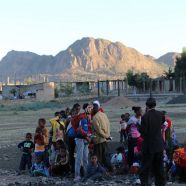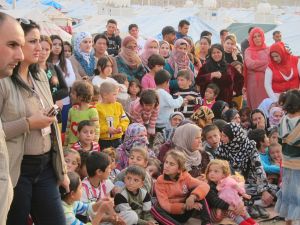
Ethiopia: hosting the most refugees in Africa. Photo courtesy of European Commission DG ECHO. ©EU/ECHO/Anouk Delafortrie. http://tinyurl.com/jt76enr
Share This
Print This
Email This
The World’s Refugee Crisis
More than one million refugees poured into Europe last year, and that figure is on track to nearly triple in 2016, with no end in sight to the wave of humanity fleeing war, persecution, and poverty in the Middle East and Africa.
According to the World Economic Forum, the end of 2015 saw the number of asylum seekers to Europe climb to 1.2 million—double that of 2014. And it is estimated that another three million asylum seekers and refugees will make their way to Europe before the end of 2016. Most alarmingly, those numbers are dwarfed by the number of refugees who have been displaced and could ultimately make their way to the West.
The Middle Eastern countries of Jordan, Lebanon, and Turkey have accepted almost four million refugees from Syria alone. Experts and humanitarian groups say the exodus has plenty of room to grow as the Middle East continues to grapple with civil war and Islamic extremism.
According to the United Nations High Commissioner for Refugees, the number of people forcibly displaced worldwide reached 59.5 million at the end of 2014—numbers not seen since World War II.
A majority of refugees have been fleeing war and persecution in such places as Afghanistan, Syria, and Iraq. But still more are fleeing conditions in countries such as Eritrea, where many are forced into a national-service program described by the UN as “an institution where slavery-like practices” are enforced by torture and rewarded with “ludicrous” pay.
Refugees also include religious minorities and mainstream Muslims fleeing Islamic State –held portions of Iraq. Those refugees include the Yazidis, a group that was nearly exterminated in 2014 as ISIS captured Sinjar, and Christians, whose numbers in Iraq have dwindled from more than one million to a few hundred thousand.
Many of the religious minorities of Iraq have fled in the past year as ISIS has forced them to either convert to their interpretation of Islam or pay jizya, or religious tax, to avoid execution.
Millions more refugees have fled Syria, where they faced death from ISIS, the forces of embattled dictator Bashar al-Assad, or the wrenching hunger and poverty brought about by the war.
In the United States, a different brand of immigration has animated the presidential campaign—mostly Mexican immigrants illegally crossing in from the southern border. There are many parallels.
On both sides of the Atlantic, refugees are transported across borders in dangerous conditions, which sometimes can result in death, as evidenced by the 500 refugees who are feared to have perished when their boat capsized in the Mediterranean between Italy and Libya.
The rapid influx in Europe has not only caused innocent lives to be lost, but it has put a strain on the unity of the European Union (EU) as well. For the past few months there has been a growing strife between Greece, where many of the refugees have been entering Europe, and its partners in the EU. Greece saw more than 800,000 refugees arrive in 2015, or two-thirds of the Europe-bound total last year. In the first two months of this year, the pace has tripled, leading Athens to ask for more than $500 million to help shelter 100,000 refugees.
Greece—which has been dealing with severe economic issues in recent years—has said it does not want to become the holding center for migrants and refugees and that the burden should be shared by other members of the EU.
In February, Greece recalled its ambassador to Austria, and other Balkan nations held a meeting to put more pressures on Athens to deal with the influx of refugees.
Despite the political infighting, the EU will have to make hard decisions on how to absorb the growing flow of refugees. The issue is already starting to change the political climate in many countries, with the rise of “Euro-skeptic” political parties opposed to the EU and its policies, as well as anti-immigrant movements.
Anti-establishment groups see policies allowing millions of refugees across their borders as proof that Europe is on the decline. They believe the refugee influx is already driving up crime, putting Europe at greater risk of terror attacks, and potentially causing unwelcome cultural changes.
As a perfect political storm continues to form over Europe, the EU and its member nations will be pressed to address these issues amid a humanitarian crisis and growing political upheaval.







